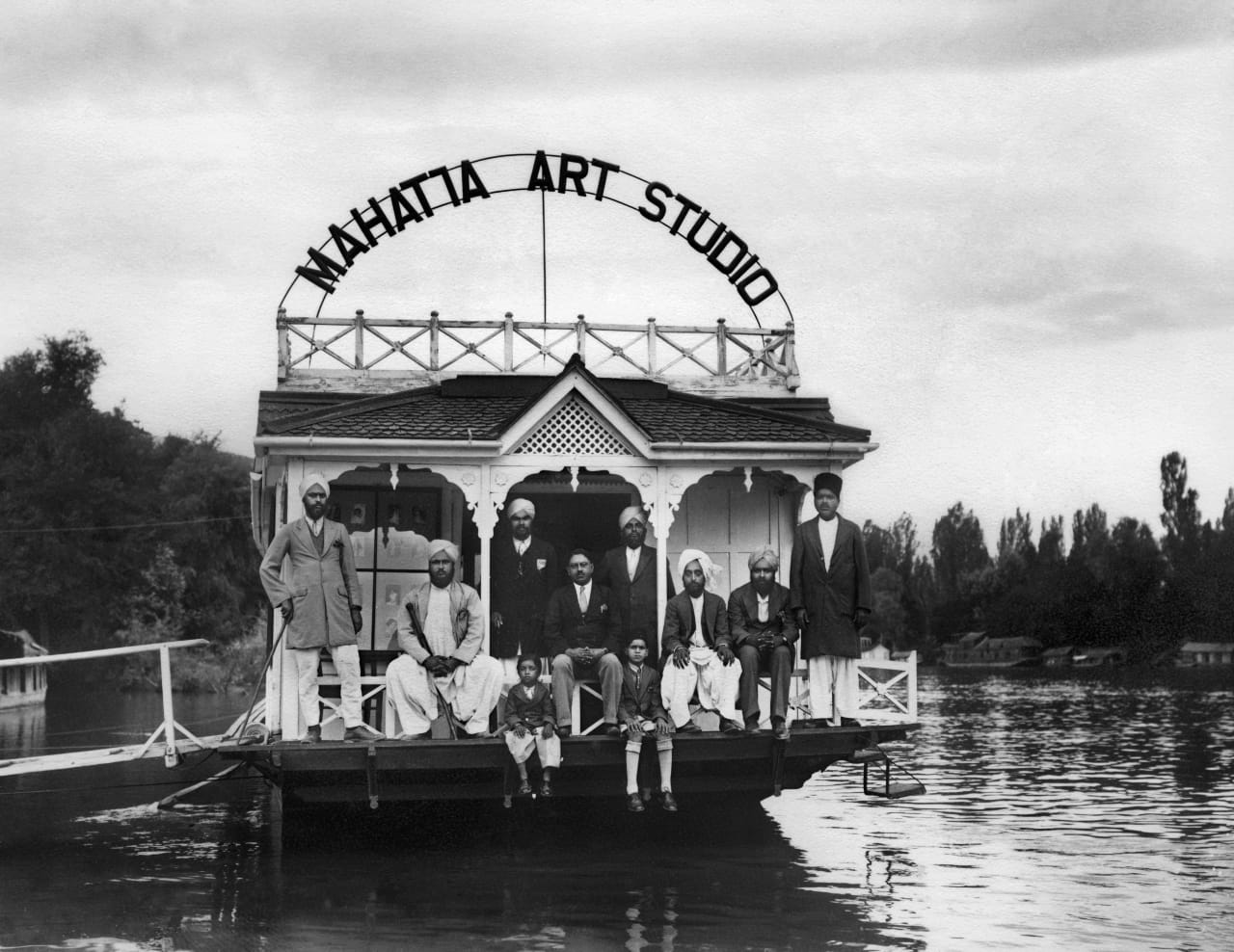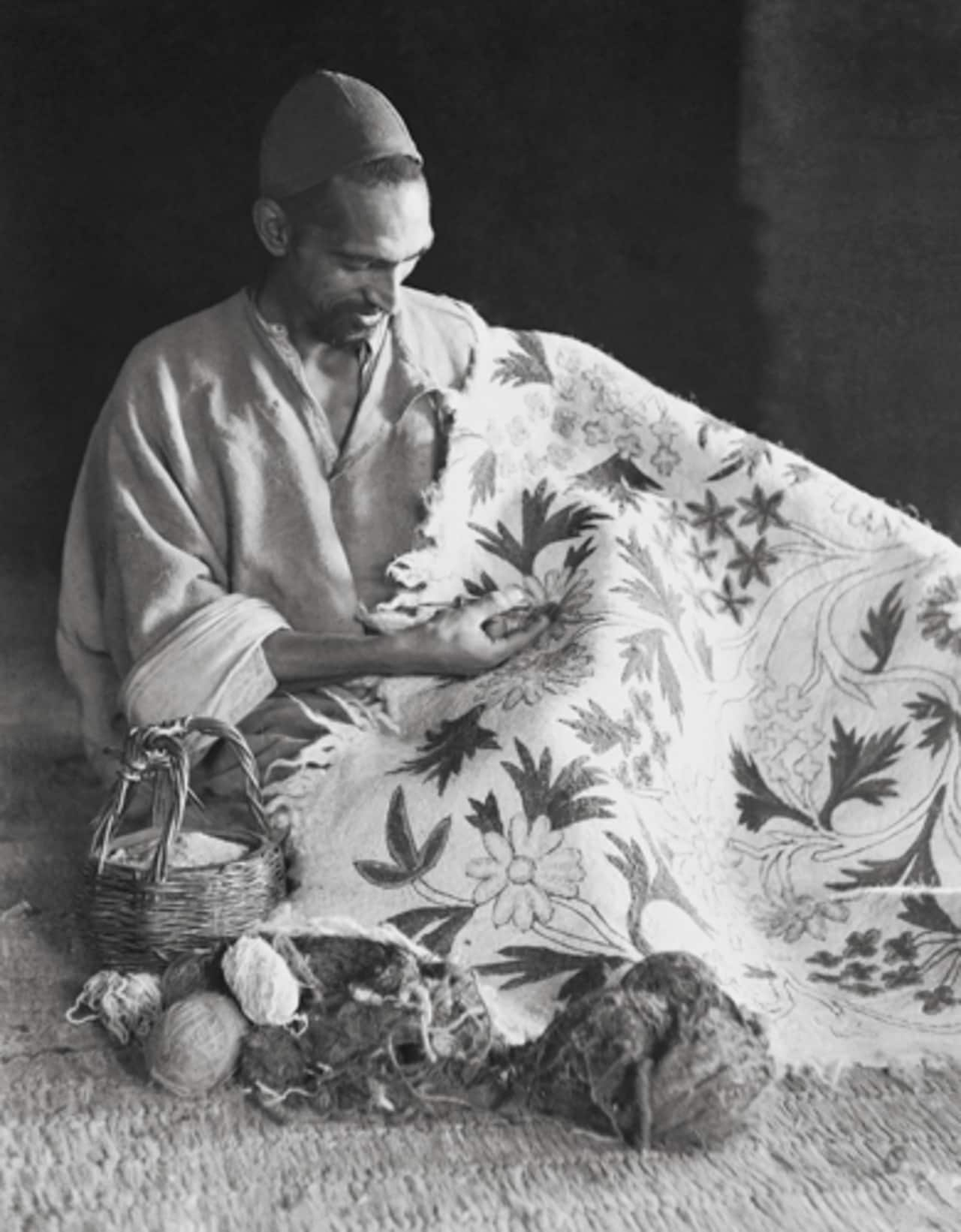



In 1905, two brothers from Punjab's Gurdaspur—Amar Nath Mehta and Ram Chand Mehta—came to Kashmir to capture the Valley’s scenic beauty in photographs.
Amazed by the breathtaking views and inflow of foreign tourists, the self-taught photographers started a photo shop inside a houseboat.
Subsequently, the Mehtas expanded their business to Rawalpindi, Sialkot, Lahore and the picturesque Murree hill station.
Business was good. In 1915, the Mehta brothers started a photo studio on The Bund, a Jhelum river embankment in Srinagar, where the studio has become iconic and continues to run 107 years on. In 2012, the photo studio—Mahatta & Co.—was recognised as the country's second-oldest photography studio by the government of India.
 Mahatta Art Studio, Jhelum, Srinagar, 1918. (Photo courtesy Mahatta & Co.)
Mahatta Art Studio, Jhelum, Srinagar, 1918. (Photo courtesy Mahatta & Co.)
Inside the 107-year-old photo studio, a piece of history—of photography as well as of Kashmir—is preserved in frame after frame, display after display. The photos capture generations of Kashmiris as well as visitors over the decades, the culture of Kashmir, the nature of Kashmir and the politics of Kashmir.
The photos are well-documented and well-segmented, offering a rare glimpse of Kashmir that most people cannot see. The studio also has rare equipment, film rolls, filters, lenses and old cameras alongside black and white photographs.
The historical cameras in the collection include a German-made Linhof, a Japanese Mamiya, an American Camflex, a German-made Gevabox, a Rollieflex, a Japanese Yashica and a 35 mm camera.
 In Kashmir, Mahatta & Co. came to be known for making unique portraits. (Photo courtesy Mahatta & Co.)
In Kashmir, Mahatta & Co. came to be known for making unique portraits. (Photo courtesy Mahatta & Co.)
1920s to 1960s
Still standing on the banks of river Jhelum in Srinagar, Mahatta & Co continues to carry the burden of Kashmir’s rich history and heritage.
The photographs displayed inside the photo studio span around four decades, from the late 1920s to the early 1960s. For example photos of British colonial troops stationed in Srinagar.
While some frames on the walls show studio portraits, Kashmir’s health resorts and people working in the fields, others depict prominent personalities such as Maharaja Hari Singh, his son Karan Singh, and Prime Minister Jawaharlal Nehru.
Anita Mehta, 70, wife of the late Ram Chand Mehta, who now looks after Mahatta & Co in Srinagar, said that in the 1930s, Mahatta photographers became professional photographers for Maharaja Hari Singh’s royal durbar. “Only we had the permission to go into Maharaja’s durbar and capture photos of his events and ceremonies, ” Anita recalls.
During her 50-year association with Mahatta, she remembers how people including tourists would end up at Mahatta & Co Studio for their unique portraits.
“We have been here for decades and we have captured the thick and thin of Kashmir. Our three generations are associated with photography. Almost our entire family has chosen this profession. But due to changing scenarios my two sons who work in New Delhi are now into wallpapers, animations, films, etc.,” Anita says.
 Chain stitch rug, Srinagar, 1962. Some of the photographs are like time capsules, preserving Kashmir's crafts and culture. (Photo courtesy Mahatta & Co.)
Chain stitch rug, Srinagar, 1962. Some of the photographs are like time capsules, preserving Kashmir's crafts and culture. (Photo courtesy Mahatta & Co.)
History project
Photographer Ghulam Mohammad Sofi, who has been with Mahatta for past 50 years, said he has often photographed prime ministers—Indira Gandhi, V.P Singh, Atal Bihari Vajpayee—and ministers—George Fernandes besides the photos J&K CM Sheikh Abdullah—during his time here.
“Since photography was done only manually, it was quite challenging to be a photographer during those days. Capturing a perfect portrait was complicated because each photo was captured after a long and hectic process. During Eid we would get long queues of people waiting to get photographs clicked outside the shop in the late 1970s and '80s,” said Sofi with a hint of nostalgia in his voice.
Sofi, who joined Mahatta on 6 February 1972, told Moneycontrol that British tourists who thronged the studio mispronounced 'Mehta' as ‘Mahatta’. Eventually, Mahatta became the brand name of photography in India. “When I joined Mahatta, I was a young boy with no beard and moustache. Since I had a passion for photography, I learned to handle the camera and capture photos from the Mehta brothers.”
 R.C. Mehta, co-founder, Mahatta & Co. Photo studios often had all kinds of props and backgrounds to make pictures as per the customer's wishes. (Photo courtesy Mahatta & Co.)
R.C. Mehta, co-founder, Mahatta & Co. Photo studios often had all kinds of props and backgrounds to make pictures as per the customer's wishes. (Photo courtesy Mahatta & Co.)
Future facing
The first floor of the building now has a photo art gallery to promote the work of local youth and the ground floor has a café where people exchange their ideas and enjoy beverages like Kashmiri Kehwa.
The family also had a famous photo studio at Delhi's Connaught place, which was closed down a few years ago. Mahatta & Co.’s other photo shops—in Rawalpindi, Sialkot, Lahore, and Murree in present-day Pakistan—had to be closed down after Partition.
“Kashmir has really given us a lot and we want to pay it back by providing a vibrant platform to local aspiring photographers. We have been hosting painting, sketching exhibitions and photography workshops in the Valley. We want Kashmiri talented youth to join us, and we will teach them the skills and promote their work,” said Anita with a smile.
 (Photo courtesy Mahatta & Co.)
(Photo courtesy Mahatta & Co.)
Discover the latest Business News, Sensex, and Nifty updates. Obtain Personal Finance insights, tax queries, and expert opinions on Moneycontrol or download the Moneycontrol App to stay updated!
Find the best of Al News in one place, specially curated for you every weekend.
Stay on top of the latest tech trends and biggest startup news.